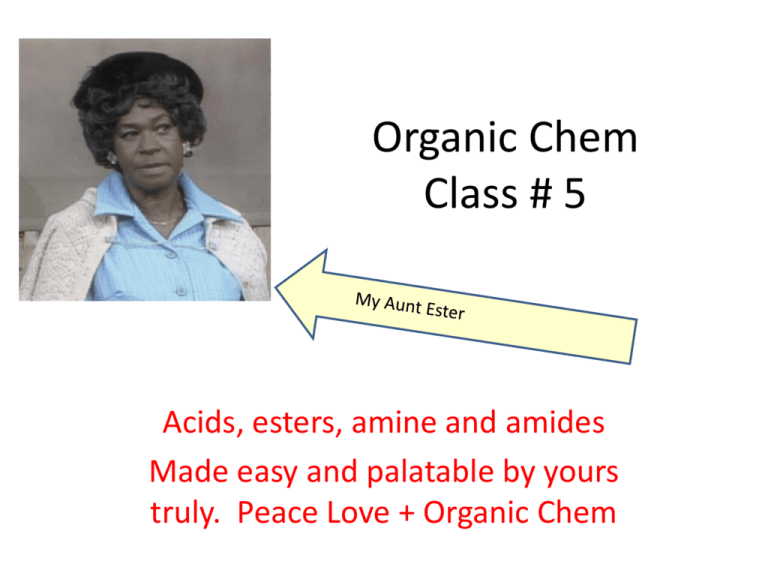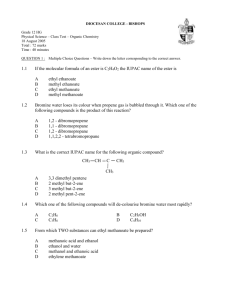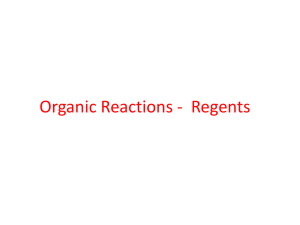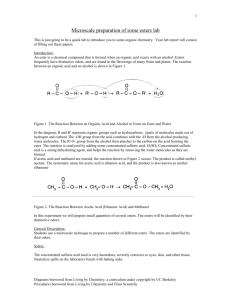Organic Chem Class # 5
advertisement

Organic Chem Class # 5 Acids, esters, amine and amides Made easy and palatable by yours truly. Peace Love + Organic Chem 91. An organic acid will release H+1 ions, but has a different formula look than our “regular” acids. The only acid in table K that is organic is ethanoic. Ethanoic acid has a different sort of formula as well. 92. All organic acids have a “—COOH” group. It’s that last H that will ionize away. O O R—C OH 93. We’ll draw it this way most of the time. R C—OH 94. Computers make this easier to type. Both ways are ok. Draw 95. Methanonic Acid 96. Ethanonic Acid 97. Propanoic Acid 98. Hexanoic Acid Draw O 95. Methanonic Acid H O H—C—OH H—C—C—OH 96. Ethanonic Acid H H O 97. Propanoic Acid H H—C—C—C—OH H H 98. Hexanoic Acid H H H H H H O C C C C C C H H H H H H 99. When you combine an organic acid with an alcohol you will end up with an ester and water. 100. This reaction is called ESTERFICATION 101. One of the best smells ever is the ester in bananas! 102. The functional group for esters is: O R —C—O—R’ 103. On one side there’s an R group. On the other side there’s a different one called R‘ (that’s R prime) 104. Unlike a lot of molecules, such as the ethers, or even most of the halocarbons, these molecules are not just left and right. There are 2 parts. To help you remember (me too) I call one side the “oxygen tail”. That’s the part that gets named first. Let’s look at the reference table at methyl propanoate. (the methyl = 1, the prop = 3) 105. Draw Methyl Propanoate O CH3CH2–C–O–CH3 The “propanoate” is on this side, it counts the 3 carbons on the left. The “methyl” is on this side, AFTER the oxygen atom. To draw an ester, start with the functional group and work out from there. 106. Draw butyl pentanoate. O ―C―O― The “other” side gets the last part of the name (penta), and it INLCUDES that carbon in the functional group. The “oxygen tail” side get the first part of the name (butyl). Do the oxygen tail side first, the butyl side 106. Draw butyl pentanoate. O ―C―C―C―C―C―O―C―C―C―C― We will ALWAYS name the “R” group on the oxygen tail FIRST. The R groups will be Methyl, ethyl, propyl, butyl, pentyl, hexyl, heptyl, octyl, nonly, or decyl. There are no other choices. On the “other” side of the ester, we’ll start with table P names, but they end in –anoate, like: Methanoate, ethanoate, propanoate… or octanoate, nonanoate, or decanoate. 107. Draw these now… Methyl hexanoate Ethyl methanoate Methyl Hexanoate 107. Ethyl methanoate 108. Now draw Ethyl propanoate and Propyl ethanoate Propyl ethanoate 108. Ethyl propanoate 109. Draw one more, get it right the first time. No mistakes… Propyl propanoate 109. Propyl propanoate Amines and Amides are similar (in the same way the aldehydes and ketones were). 110. The Amines + Amides both contain NITROGEN. 111. Count to 3 for nitrogen, N must always make 3 bonds. 112. Amines are always found in the middle of a chain 114. Amides are always found on the end of a chain. Location, location, location! 115. AMINES 116. AMIDES R’ O H R―N―R” R―C―N―H The nitrogen atom is in the center of three “R” groups. In college organic chem, these would be three hydrocarbon chains of any length. In our class, the R’ and R” groups will always be hydrogen atoms.. These groups are always at the end of a chain, and the nitrogen is attached to a carbon which is also attached to an oxgyen. Although the “N” could have 2 chains, it will only have 2 hydrogen atoms in our class. Amides for us will be Amines can be attached to any carbon in a chain. Amines for us will be R―NH2 O H R―C ―N―H 117. Draw 4-octanamine and hexanimide 4-octanamine C C C C C C C C N―H H 117. O C C C C C C N―H H hexanimide OC Class 6 OB: Examining and Mastering the Organic Chemical Reactions: Substitution, Addition, Fermentation, Esterfication, Polymerization, and Saponification. We have seen substitution reactions last week when we discussed the formation of halocarbons. We need to stick halogens (F, Cl, Br, or I) into a saturated hydrocarbon. Being saturated, there is NO ROOM for any new atoms, so we need to substitute in one halogen atom for a hydrogen atom. 118. Substitution reactions: Saturated Hydrocarbon (alkane) Propane + + + Halogen (F, Cl, Br, or I) F2 + F2 Halocarbon + HX (X = halogen atom) 1-fluoropropane + HF Saturated Hydrocarbon (alkane) Propane + Halogen + + (F, Cl, Br, or I) F2 + F2 118. Halocarbon + HX (X = halogen atom) 1-fluoropropane + HF F + HF Draw these 2 substitution reactions with structural diagrams and NAME the products properly. 119. Ethane + chlorine yields… 120. Butane + iodine yields 2-iodobutane + HI Do these 2 substitution reactions… 119. Ethane + chlorine yields chloroethane + HCl + Cl2 Cl + HCl 120. Butane + iodine yields 2-iodobutane + HI + I2 + HI I 121. For ADDITION reactions, we’ll start with a halogen and a NON-SATURATED hydrocarbon, an alkene or alkyne. We will ADD the halogen into it 122. Let’s draw and wrote the word equation for: Ethene + Bromine yields 1,2 dibromoethane For ADDITION reactions, we’ll start with a halogen and a NON-SATURATED hydrocarbon, an alkene or alkyne. We will ADD the halogen into it 122. Ethene + Bromine yields 1,2 dibromoethane + Br2 Br Br The double bond opens, a bromine is added to each carbon (not onto 1 carbon) A triple bond would open into a double bond, and you’d add the Br the same way. 123. Draw: Propene and chlorine → 1,2 dichloropropane 124. Ethyne and fluorine → 1,2 difluoroethene 123. Propene and chlorine yields 1,2 dichloropropane Cl + Cl2 Cl 124. Ethyne and fluorine yields 1,2 difluoroethene F F + F2 H—C=C—H Fermentation is a chemical process known to humans for thousands of years. It turns fruit juice, or vegetable juice into ethanol and carbon dioxide. It’s how to make champagne, or wine, or beer, or even stronger liquors. It’s a billions of dollars a year industry around the world, it’s wonderful in small amounts when you’re over 21, and it can be terrible too. Devastating. It’s not good for any one, your body must process this ethanol away as a toxin. It can change your life into hell if you drink too much of it. It will change the way you think, and it is not as casual as most teenagers think. Don’t drink until you’re 21. Never ever drive or go driving with someone who has been drinking. Ever, anyone, no matter what. 125. Fermentation is the organic chemical reaction that turns sugars into ethanol and carbon dioxide by way of yeast enzymes. 126. This is not a reaction that happens outside of the yeast. Yeast excrete waste products called ethanol and CO2, by anerobic respiration. 128. Sugars yeast enzymes in water CH3CH2OH + CO2 129. Polymerization the process of making plastics. At right is a clip from the movie “The Graduate” with Dustin Hoffmann (he’s the guy on the left). That other man is saying to Ben (who just graduated from college) “I have just one word of advice for you.” “Are you listening to me Ben?” “Yes.“ Ben replies. So he says: “Plastics.” 130. Polymerization poly means many mer means unit or body -ization means the process of the organic chemical reaction of making plastics or polymers. 131. A lot of… ethene molecules n can form long chains of a polymer called polyethene catalyst catalysts break open those double bonds, allowing the “mers” to unite into chains that go on and on, and are indefinite in length. There is not a “real” formula for the polymer formed. the polyethene formula is (-CH2CH2-)n Other plastics that you probably know of already are 132. PVC, or polyvinyl chloride is the OLD FASHIONED name for the plastic white pipes made in Vestal, and used for plumbing in your home. It starts out with CH2=CHCl as the “mer”. You’d call this chloroethene. 133. Polyethylene is what thin, soft clear plastic food bags are made of (look at your sandwich bag). 134. Polystyrene (Styrofoam) is another plastic you have used. This one is white + opaque. 135. Different plastics, different properties. They all start with billions of identical “mers” and form polymers with unique properties. 136. Teflon (used in frying pans) is Polytetrafluoroethylene. The “mer” is CF2=CF2 which you’d call 1,1,2,2 tetrafluroethene. (technically the 1,1,2,2 is unnecessary, there are no other places to put the 4 fluorine atoms) 137. CH2=CCl2 is the mer that makes Saran wrap (thin clear food plastic). you’d call it 1,1 dichloroethene. 138. Esterfication is when an acid + an alcohol form an ester (and water). Acid + alcohol yields an ester + H2O 139. we will combine propanoic acid + ethanol (draw structural diagrams for this now) Acid + alcohol yields an ester + H2O 139. we will combine propanoic acid + ethanol + OH HO H H C C H H H Acids will ionize the hydrogen in the –COOH group. Alcohols do not ionize at all. To form water, something a bit odd happens. The OH in the -COOH group combines to the H in the -OH group of the alcohol to make the water HOH. The rest of the molecules squeeze into a big molecule, the ester. Acid + alcohol yields an ester + H2O we will combine propanoic acid + ethanol + HO OH H H C C H H H This OH and H makes the water. 140. the rest of the 2 molecules go together like this: + HOH Ethyl Propanoate 141. Draw the reactant molecules and product molecules (and product names) butanoic acid + 1-propanol form an ester + water 141. butanoic acid + 1-propanol form an ester + water + HO H H H C C C H H H H OH + HOH Propyl Butanoate I use that stuff 142. SAPONIFICATION is the most complex reaction but the easiest to recognize and remember. If you misspell the reaction the first four letters might spell out SOAP. In fact, this organic reaction is the reaction that makes SOAP. (the take a bath kind) Did I say SOAP? + 3 NaOH Note, a fat like this contains 3 ester groups, this is a triple ester You can use any 3 bases, different bases will result in different kinds of soap, softer, harder, liquid or solid, different colors, etc. The products of saponification are a triple alcohol (you have heard of glycerol, and soap. Note, the soap has a “triple” molecular shape, and contains an ION as well. This ion makes it better able to break up surface tension in water (remember those bugs?) + 3CH3(CH2)14CO2Na+ We don’t have to name these molecules, just “recognize” them at the end of this equation. Organic Chem Class #7 OB: Branched Hydrocarbons Drawing them, naming them, and ISOMERS TOO. We’ll need lots of paper, and your thinking caps on. We’ve learned that ISOTOPES are chemically identical atoms with different atomic masses (different numbers of neutrons) which are the reason for average atomic masses being decimals. We’ve learned about ALLOTROPES, such as graphite and diamonds, both pure carbon, but bonded differently and with different properties. If you don’t believe that, try to take the regents with a diamond, or get engaged with a pencil! 144. ISOMERS are organic compounds with the same chemical formula, but different structures, so they have the same molar mass, but totally different properties. 145. Examples are ethanol and dimethyl ether What are the structural formulas + the chemical formulas for these 2 molecules? Condensed Chemical structural formulas formulas Ethanol Dimethyl ether 145. Examples are ethanol and dimethyl ether What are the structural formulas + the chemical formulas for these 2 molecules? Chemical formulas Ethanol CH3CH2OH Dimethyl ether CH3OCH3 Condensed structural formulas C2H5OH or C2H6O C2H6O Branched hydrocarbons will also be isomers. Count the carbon atoms, if all the bonds are single bonds, then equal numbers of carbons will be isomers even though the molecules are “different”. 146A. Draw hexane 146B. Draw 2,3-dimethyl butane. 146A. Draw hexane and draw 2,3-dimethyl butane. CH3 There’s a methyl group hanging off of the #2 and the #3 carbon. It is an isomer to hexane. CH3 147. Count carbons and count hydrogen atoms in the above 2 molecules. Do they have the same chemical formulas? ________ Same number of Carbons? _______ Same number of Hydrogens? _______ These 2 molecules are called _____________________ of each other. They have different physical structures + different properties but the same _____________________. 148. Draw pentane + 2methylbutane. Are these isomers? 148. Isomers? YES! 149. Draw 3-ethyl hexane 150. 3methyl-4,5-dibromo hexane 151. Draw 7ethyl, 8-fluoro, 2nonyne 152. Draw all the pentane isomers, and name them, what is the chemical formula for pentane? n-pentane (or normal pentane) methylbutane dimethyl propane -C-C-C-C-C-C-C-C-C-C- -C-C-C-C-C- Time to draw two posters… Organic Chem Class #6b OB: the mastering of organic esterification reactions + the rest of them Each student will choose an organic acid (1-10 carbons long), plus an alcohol (1-10 carbons long, make sure it’s a #1 alcohol please), and form HOH plus the proper ester. We’ll draw these neatly with color pencils (as practiced together first), Then we’ll choose one more reaction (addition, substitution, fermentation, polymerization, or saponification) and draw out one nice looking example. All drawings will be reviewed as a classwork grade, and the best ones will be added to the website for review purposes. Esterification: the chemical reaction between an organic acid + an alcohol to form an ester (and H2O). Choose 1-10 acid and alcohol. I choose pentanoic acid and methanol alcohol. Draw acid first, “facing” the alcohol, the alcohol is to be drawn HO- side facing the acid. Pentanoic Acid + Methanol yields HOH CH3CH2CH2CH2COOH + HOCH3 + Methyl Pentanoate HOH + CH3CH2CH2CH2COOCH3 O C C C C + C HO OH O C C C C C O C C HOH + You must choose an acid and an alcohol and draw a full page diagram for it. Label it with words, and condensed structural formulas. (you can’t choose mine, and don’t choose methyl methanoate because you’re too lazy to draw a few extra carbons + hydrogen atoms. We need a full mix if possible. Then choose one other reaction, run it by me, then make a second poster as well. Finally, finish up the reactions and drawings for your organic lab report today.





